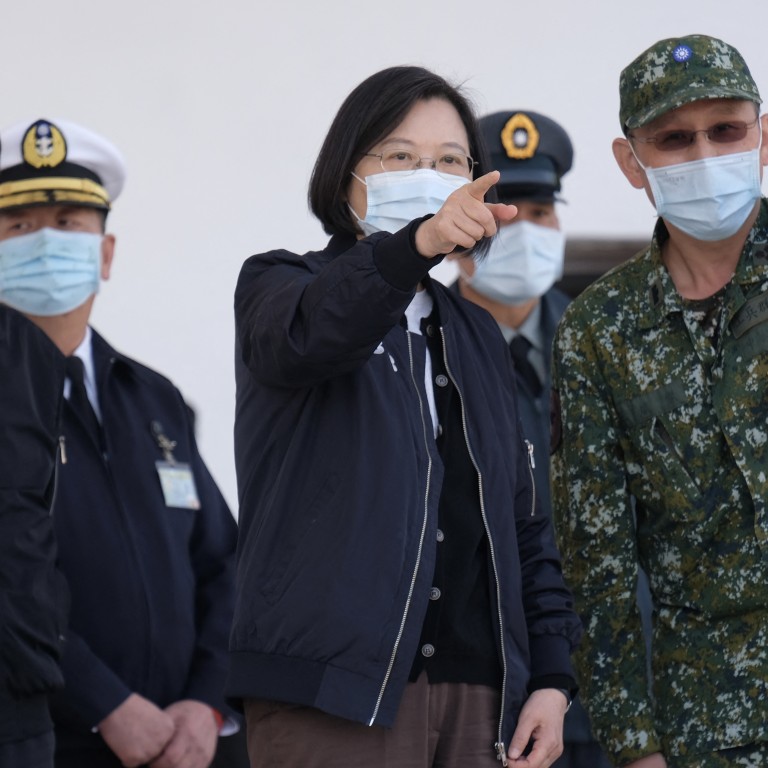
Failure to defend Taiwan would be ‘catastrophic’ for peace in Asia, Tsai Ing-wen says
- Island will do whatever it takes to defend itself, with the consequences of failure reaching beyond its shores, Tsai writes in Foreign Affairs magazine
- Japanese foreign minister says Tokyo hopes Taipei and Beijing can resolve their differences, but will weigh possible scenarios ‘to consider what options we have’
In an article published in Foreign Affairs magazine on Tuesday, Tsai said Taiwan would not bend to pressure, but nor would it turn “adventurist”, even with support from the international community.
“Taiwan lies along the first island chain, which runs from northern Japan to Borneo; should this line be broken by force, the consequences would disrupt international trade and destabilise the entire western Pacific,” Tsai wrote.
“In other words, a failure to defend Taiwan would not only be catastrophic for the Taiwanese; it would overturn a security architecture that has allowed for peace and extraordinary economic development in the region for seven decades.”
Beijing claims Taiwan as its own territory, to be reunited with the mainland by force if necessary.
Since Friday, Taiwan has reported 150 People’s Liberation Army Air Force planes in the southern and southwestern part of its ADIZ.
On Tuesday, Taiwan’s defence ministry said a Y-8 anti-submarine aircraft flew into the southwest part of Taiwan’s air defence identification zone and was warned off by the island’s air force.
According to the ministry, the PLA plane was flying from the province of Fujian towards the southwest corner of the island’s ADIZ and was near the Taipei-controlled Pratas Islands.
Tsai said Taiwan did not seek military confrontation, but “will do whatever it takes to defend itself”.
The island said it scrambled jets and deployed missiles to warn off 56 mainland military aircraft on Monday, including 34 J-16 fighter jets, 12 H-6 bombers and two Su-30 jets.
It came after Beijing sent 38 warplanes to Taiwan’s ADIZ on Friday, followed by 39 on Saturday and 16 on Sunday.
“Taiwan must be on alert. China is more and more over the top,” Taiwanese Premier Su Tseng-chang said in Taipei. “The world has also seen China’s repeated violations of regional peace and pressure on Taiwan.”
Taiwan needed to “strengthen itself” and come together as one, he added.
“Only then will countries that want to annex Taiwan not dare to easily resort to force. Only when we help ourselves can others help us.”
Conflict risk could rise without Beijing-Taipei channel, mainland expert warns
The mainland military deployment came as the United States, Britain, Japan, the Netherlands, Canada and New Zealand held joint naval drills in the Philippine Sea.
“Our commitment to Taiwan is rock solid and contributes to the maintenance of peace and stability across the Taiwan Strait and within the region,” White House press secretary Jen Psaki said.
Japan said it hoped Taiwan and mainland China could resolve their differences through talks.
“Japan believes that it is crucial for the situation surrounding Taiwan to be peaceful and stable,” Foreign Minister Toshimitsu Motegi said in Tokyo.
“Additionally, instead of simply monitoring the situation, we hope to weigh the various possible scenarios that may arise to consider what options we have, as well as the preparations we must make.”
Australia’s Department of Foreign Affairs said it too was concerned by China’s increased sorties.
“Resolution of differences over Taiwan and other regional issues must be achieved peacefully through dialogue and without the threat or use of force or coercion,” it said.
Chinese foreign ministry spokeswoman Hua Chunying said seeking Taiwanese independence was a dead end, and China was determined to protect its territorial integrity.
Additional reporting by Lawrence Chung and Reuters

